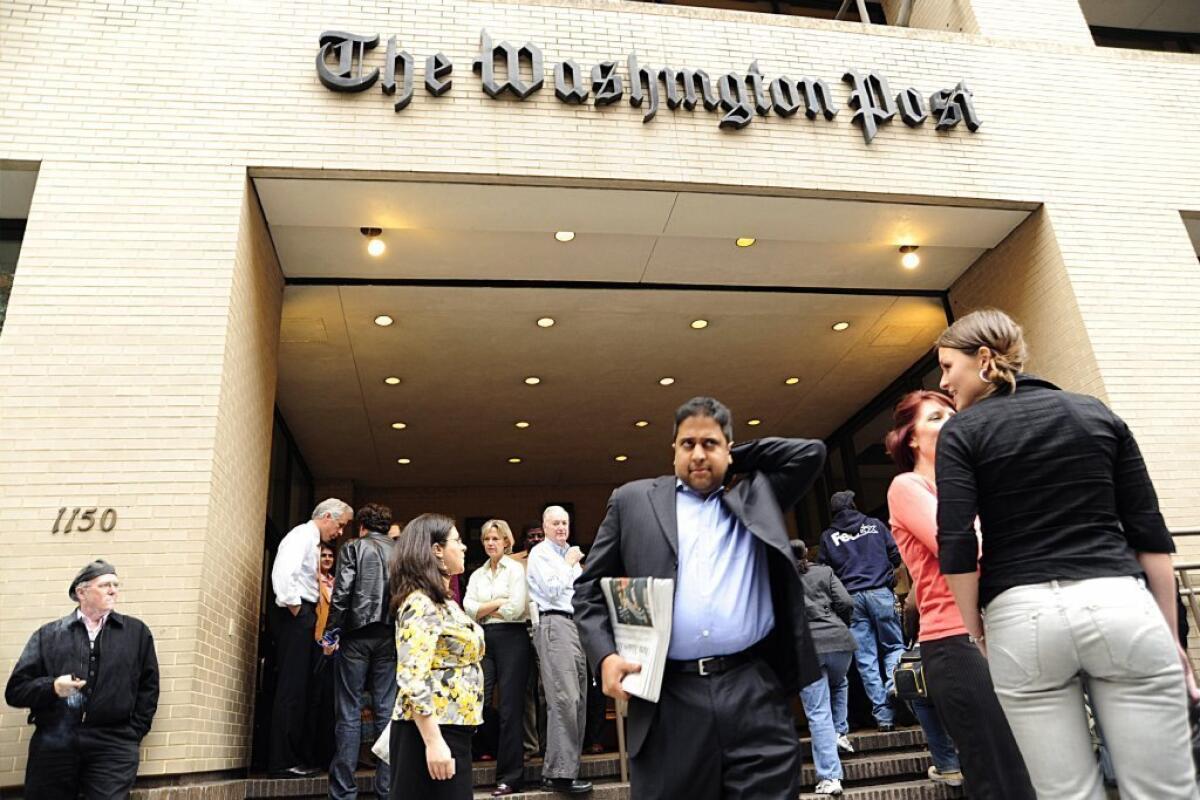Bezos’ Washington Post deal comes as tech focuses on news business

- Share via
In Thursday’s paper, we looked at how Silicon Valley is reacting to the news that Jeff Bezos has acquired the Washington Post.
As the news industry has floundered, Silicon Valley has taken note. It’s been interesting in recent years to see how various companies and personalities have turned their attention to the woes of the news business.
Last year, Bill Campbell, chair of Intuit and a director at Apple, played a key role in establishing the joint news innovation program between Stanford and Columbia universities. Facebook co-founder Chris Hughes not only purchased the New Republic, he’s also an investor in Upworthy, an innovative news aggregation site.
A few years ago, the prestigious John. S. Knight Journalism Fellowships program at Stanford University rebooted its mission to focus on entreprenerial journalism projects. And more recently, the Mozilla Foundation, which makes the Firefox browser, teamed up the Knight Foundation to launch the Knight-Mozilla OpenNews fellowships.
On Wednesday, just a couple of days after the Post deal was announced, Google just happened to be hosting a news innovation summit sponsored by the Berkeley-based Center for Investigative Reporting. The event was the latest in a series the center has dubbed “Techraking” (technology + muckraking) to explore the intersection of technology and journalism. This latest event explored how journalism could better use data to find and tell stories.
Being featured at the event were eight Google Journalism Fellows.
“In an effort to help develop the next crop of reporters working to keep the world informed, educated and entertained, we have created the Google Journalism Fellowship,” says the program’s website. “As a company dedicated to making the world’s information easily accessible, Google recognizes that behind many blue links is a journalist and that quality journalism is a key ingredient of a vibrant and functioning society.”
The main speaker at Techraking was Richard Gingras, head of news and social products at Google, who told the crowd that finding new ways to tap data offered a powerful tool for journalists.
“Great strides have been made, but great strides are still to be made,” Gingras said. “As I’ve spent time at colleges, I’ve been inspired by the growing number of students pursuing degrees in both computer science and journalism. My own optimism about the future of journalism is largely based on the work people in this room are doing.”
In between sessions at Techraking, the Bezos deal was discussed in the halls.
Ann Grimes, the director of the graduate journalism program at Stanford, where she teaches classes in technology reporting, digital media and entrepreneurship, said she hoped the Bezos purchase would give the news industry a shot of adrenaline. Especially on the business side, which she says has failed to adapt the Web as much as newsrooms have.
“It’s not the news that’s the problem,” Grimes said. “It’s the business side. If he can bring his experience to this side, he can have a lasting impact.”
Grimes added: “Amazon knows who you are. They know what you like. Newspapers need to be a lot more open to that. Newspapers are so far behind. If he can jump-start that and get them moving, that would be great.”
Burt Herman, a former Associated Press reporter who co-founded social media start-up Storify, said he’d like to see newsrooms build larger networks of contributors from their local communities. Herman said Amazon has embraced its users’ reviews as a critical part of its site.
Newspapers, because they still have high-quality writers, should be able to attract smart contributors who can extend the networking of writing and reporting. But he knows many newspapers are still leery of user-generated content.
“It’s what every newspaper should have done,” Herman said. “And they all missed the boat.”
ALSO:
After Bezos purchase, Sulzberger says N.Y. Times ‘is not for sale’
Silicon Valley optimistic about Jeff Bezos buying Washington Post
Washington Post buy: Can Jeff Bezos fix newspapers’ business model?
More to Read
Inside the business of entertainment
The Wide Shot brings you news, analysis and insights on everything from streaming wars to production — and what it all means for the future.
You may occasionally receive promotional content from the Los Angeles Times.











